|
|
|
Sort Order |
|
|
|
Items / Page
|
|
|
|
|
|
|
| Srl | Item |
| 1 |
ID:
023767


|
|
|
|
|
| Publication |
New York, St. John's University, 1981.
|
| Description |
lxi, 978p.Hbk
|
| Contents |
Abridge edition by Chun-Ming Chang
|
| Standard Number |
087075259
|
|
|
|
|
|
|
|
|
|
|
|
Copies: C:1/I:0,R:0,Q:0
Circulation
| Accession# | Call# | Current Location | Status | Policy | Location |
| 026896 | 923.151249/FUR 026896 | Main | On Shelf | General | |
|
|
|
|
| 2 |
ID:
023768


|
|
|
|
|
| Edition |
Abridged English ed.
|
| Publication |
New York, St. John's University, 1981.
|
| Description |
lxi, 978p.Hbk
|
| Contents |
Abridge Edition by Chun Ming Chang.
|
| Standard Number |
087075259
|
|
|
|
|
|
|
|
|
|
|
|
Copies: C:1/I:0,R:0,Q:0
Circulation
| Accession# | Call# | Current Location | Status | Policy | Location |
| 020661 | 923.159249/FUR 020661 | Main | On Shelf | General | |
|
|
|
|
| 3 |
ID:
072550
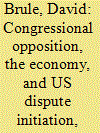

|
|
|
|
|
| Publication |
2006.
|
| Summary/Abstract |
Does congressional opposition constrain the president's conflict behavior in response to poor economic performance? Other research has shown that legislative constraints such as divided government reduce the executive's propensity to initiate conflict. But institutional constraints on democratic leaders may also make them likely to use force abroad when faced with deteriorating domestic conditions. The author argues that legislative constraints on presidential action during periods of economic decline compel the president to pursue alternatives that he can implement without congressional approval to display his leadership skills-including the use of military force abroad. The author examines the interactive effects of congressional opposition and economic performance on the propensity to initiate militarized interstate disputes from 1946 to 2000. The president is more likely to use force in response to economic decline when facing an opposition Congress than during years in which he enjoys partisan support in the legislature.
|
|
|
|
|
|
|
|
|
|
|
|
|
|
|
|
| 4 |
ID:
090834


|
|
|
|
|
| Publication |
2009.
|
| Summary/Abstract |
Some European constitutions give cabinets great discretion to manage their own demise, whereas others limit their choices and insert the head of state into decisions about government termination. In this article, we map the tremendous variation in the constitutional rules that govern cabinet termination and test existing expectations about its effects on a government's survival and mode of termination. In doing so, we use the most extensive government survival data set available to date, the first to include East and West European governments. Our results demonstrate that constitutional constraints on governments and presidential influence on cabinet termination are much more common than has previously been understood and have powerful effects on the hazard profiles of governments. These results alter and improve the discipline's understanding of government termination and durability, and have implications for comparative work in a range of areas, including the survival and performance of democracies, electoral accountability, opportunistic election calling, and political business cycles.
|
|
|
|
|
|
|
|
|
|
|
|
|
|
|
|
| 5 |
ID:
074829
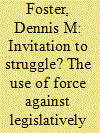

|
|
|
|
|
| Publication |
2006.
|
| Summary/Abstract |
Recently, international relations scholars have posited that, though economically unsuccessful American presidents may have incentives to divert via international conflict, their potential adversaries are also privy to their plight and may seek to avoid fighting them at such junctures. However, this "strategic conflict avoidance" (SCA) perspective offers relatively few insights concerning the impact of a potentially important source of leadership weakness in the American case: legislative opposition to presidential policy. Indeed, scholars seem uncertain about whether general legislative opposition actually drives American presidents to divert or leads them to refrain from international ventures. This article seeks to develop and test a general theory concerning the targeting of presidents who face legislative opposition to their foreign policies. The article predicts that economic distress increases "conflict avoidance" on the part of potential adversaries, whereas overt legislative opposition to presidential foreign policy decreases the utility of diversion and creates transparent elite divisions that invite targeting. Negative binomial generalized estimating equations (GEE) models of the U.S. foreign policy experience from 1949 to 2001 support these predictions, in that the U.S. is less likely to be the target of incident initiation by other states when the economic misery index increases, but is more likely to be targeted when members of Congress voice displeasure with presidential foreign policy. Further analyses show that these findings are generally strongest during periods of high American inflation, in the context of enduring rivalries, and during the Cold War.
|
|
|
|
|
|
|
|
|
|
|
|
|
|
|
|
| 6 |
ID:
127673
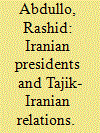

|
|
|
|
|
| Publication |
2013.
|
| Summary/Abstract |
The author examines the relations between the two countries in the context of the political processes going on in Iran. Throughout the twenty years of Tajikistan's independence, these relations have passed through different stages, each of them marked by Tehran's political course and the personalities of each of the Iranian presidents. At the early stages, flexible and cautious Rafsanjani preferred to limit contacts to cultural cooperation; Tehran, however, did not shun involvement in the domestic conflict in Tajikistan as a broker; its positive contribution cannot be overestimated. This was when the two countries set up a base for closer trade and economic contacts; they encouraged business trips and tourism in an effort to become better acquainted with each other. Under President Khatami bilateral relations acquired an even stronger economic bias. Iranian investments helped to implement several large-scale strategic infrastructural projects initiated by the government of Tajikistan. It was during the presidency of Mahmoud Ahmadinejad that relations between the two countries reached a new and higher level: Iran became a strategic partner and the largest investor. Tehran invested in strategically important projects in energy, transport, and communication. Recently elected President Hassan Rouhani, known as subtle politician and diplomat, will probably change the development vector of relations between the two countries.
|
|
|
|
|
|
|
|
|
|
|
|
|
|
|
|
| 7 |
ID:
153562
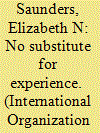

|
|
|
|
|
| Summary/Abstract |
Despite advances in the study of individuals in international relations, we still know little about how the traits and biases of individuals aggregate. Most foreign policy decisions are made in groups, usually by elites with varying degrees of experience, which can have both positive and negative psychological effects. This paper addresses the aggregation problem by exploring how the balance of foreign policy experience among leaders and advisers affects decision making in war, using a principal-agent framework that allows the relative experience of leaders and advisers to vary. A leader's experience affects decision making and, ultimately, the risks associated with conflict, through three mechanisms. First, experience influences a leader's ability to monitor advisers. Second, a leader's experience affects the credibility of delegation to experienced advisers and, in turn, the nature and extent of information gathering. Third, experience affects whether leaders are able to diversify advice, as well as their preference for policies that appear certain. I illustrate the argument using two cases that hold an unusual number of factors constant: the 1991 and 2003 Iraq Wars. George W. Bush's inexperience exacerbated the biases of his advisers, whereas his father's experience cast a long shadow over many of the same officials. Understanding the experience and biases of any one individual is insufficient—the balance of experience within a group is also important. Experience is therefore not fungible: a seasoned team cannot substitute for an experienced leader.
|
|
|
|
|
|
|
|
|
|
|
|
|
|
|
|
| 8 |
ID:
186519
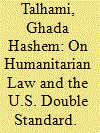

|
|
|
|
|
| Summary/Abstract |
U.S. criticism of its client/ally Saudi Arabia regarding the killing of journalist Jamal Khashoggi immediately diminished the kingdom’s ability to secure funds for its latest mega development project, the Neom convention center. U.S. intelligence pinned the crime on aides to Crown Prince Muhammad Bin Salman (MBS). At the same time, a seemingly unauthorized operation, later attributed to former president Donald Trump, killed a top Iranian commander, Qasem Suleimani, by a drone strike. Congress was not involved and the UN protested this as a violation of Article 51 of its Charter, emphasizing that this was justified in a case of imminent threat, undertaken only by a state. Encouraged by drone technology, the U.S. found it easy to locate the target and minimize collateral damage. International lawyers and military experts are still debating the legitimacy of such action. The U.S. is persisting in claiming that it upholds the standards of international humanitarian law which sometimes sanctions targeted killing. A number of international law professors continue to deride U.S. action as illegal, while the latter continues to describe its actions as defensive in nature. Organizations such as Human Rights Watch lament the reluctance of previous U.S. presidents to define targeted killing.
|
|
|
|
|
|
|
|
|
|
|
|
|
|
|
|
| 9 |
ID:
182592
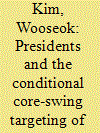

|
|
|
|
|
| Summary/Abstract |
In this article, I present a theory of conditional core-swing targeting that focuses on the competition for majority control in legislative elections to explain how presidents use their strong budgetary powers to manipulate the distribution of the national subsidy in South Korea. Presidents whose parties already possess a legislative majority are expected to favor core municipalities to strengthen the foundations of their majority constituency, whereas those who seek majority control are predicted to prioritize swing municipalities in an effort to cross the majority threshold. Presidents are also anticipated to respond to the electoral cycle by shifting subsidies to riskier municipalities when elections approach. Using a novel data set on national subsidy allocations that spans three decades, I find evidence in favor of the hypotheses. This article demonstrates that the beneficiaries of distributive favoritism are not fixed, and that politicians can engage in complex and varied targeting strategies to achieve their objectives.
|
|
|
|
|
|
|
|
|
|
|
|
|
|
|
|
| 10 |
ID:
170595
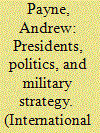

|
|
|
|
|
| Summary/Abstract |
How do electoral politics affect presidential decisionmaking in war? As both commander in chief and elected officeholder, presidents must inevitably balance competing objectives of the national interest and political survival when assessing alternative military strategies in war. Yet, how and when electoral pressures influence decisionmaking during an ongoing conflict remains unclear. Drawn from the logic of democratic accountability, two mechanisms of constraint may be inferred. First, presidents may delay making decisions that are perceived to carry excessive electoral risk. Second, electoral pressures may have a dampening effect, causing presidents to water down politically sensitive courses of action to minimize any expected backlash. Recently declassified documents and interviews with senior administration officials and military figures illustrate these mechanisms in a case study of decisionmaking during the second half of the Iraq War. Both George W. Bush's surge decision of 2007 and Barack Obama's decision to withdraw troops in 2011 are shown to have been profoundly influenced by concerns related to the domestic political calendar. These findings call for further study of the nuanced ways in which the electoral cycle shapes wartime decisionmaking.
|
|
|
|
|
|
|
|
|
|
|
|
|
|
|
|
| 11 |
ID:
072143
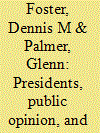

|
|
|
|
|
| Publication |
2006.
|
| Summary/Abstract |
Numerous works have studied the relationship between public approval and the propensity of United States presidents to use force abroad. One of these (Morgan and Bickers 1992 ) relies upon a refined view of internalization-externalization processes to reformulate the diversionary theory of conflict. The authors postulate that, as presidents are concerned with maintaining popularity among individuals upon whose support their continued power rests, they are more inclined to use diversionary force when approval among members of their party declines. Using more extensive and comprehensive measures of militarized actions, we find no support for Morgan and Bickers' original hypothesis, indicating that the results of one of the very few works that finds any evidence of diversion from low public approval may not be valid. In fact, event count analyses reveal that precisely the opposite relationship is operative. Additionally, Morgan and Bickers' formulation fails to account for potential differences in conflict propensity stemming from differences in political parties. We hypothesize that presidents whose partisan supporters are expected to react favorably to "hawkish" actions (Republicans) are more likely to use force abroad when faced with declining partisan support than those leaders whose partisan supporters are generally "dovish" (Democrats). Our results yield little support for this hypothesis. We conclude the article by exploring some possible explanations for our findings.
|
|
|
|
|
|
|
|
|
|
|
|
|
|
|
|
| 12 |
ID:
153790
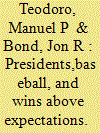

|
|
|
|
|
| Summary/Abstract |
Presidential scholars and baseball writers debate who were the greatest. While baseball analysis evolved from qualitative impressions of “experts” to rigorous, data-driven “sabermetrics,” analysis of presidential greatness continues to rely on “old-school” reputational rankings based on surveys of scholars’ qualitative assessments. Presidential-congressional relations and baseball are all about winning, but what fans (of sports and politics) find most intriguing is Wins Above Expectations (WAE)—did the team do better or worse than expected? This paper adapts the Pythagorean Expectations (PE) formula developed to analyze baseball to assess legislative success of presidents from Eisenhower to Obama. A parsimonious regression model and the PE formula predict annual success rates with 90% accuracy. The estimates of WAE from the two approaches, however, are uncorrelated. Regression analysis does not identify any president who systematically exceeded expectations, but sabermetric analysis indicates that Republican presidents outperform Democrats. Neither approach correlates with recent presidential greatness rankings.
|
|
|
|
|
|
|
|
|
|
|
|
|
|
|
|
| 13 |
ID:
131550
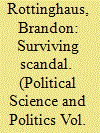

|
|
|
|
|
| Publication |
2014.
|
| Summary/Abstract |
Which factors shorten or lengthen the survival of a scandal involving a chief executive? Using new data tracking scandals involving presidents and governors from 1972 to 2011, I chart the duration of each political, personal, and financial scandal faced by an elected official, their staff, or nominees. I specifically examine institutional, political, and economic factors to investigate what factors quicken a "negative" end to a scandal. National chief executives and their staff are more likely to survive a scandal when they have more partisans in the legislature but are less likely when there is greater political opposition, however there is no comparative effect at the state level. Positive economic growth and public approval have no effect on survival of a scandal at either the national or state levels. These findings clarify how the political environment shapes the duration of executive scandal.
|
|
|
|
|
|
|
|
|
|
|
|
|
|
|
|
| 14 |
ID:
184080
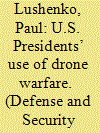

|
|
|
|
|
| Summary/Abstract |
Scholars often reduce America's use of drones to a bureaucratic process. While this enables them to recognise shifts in America's use of strikes since 2002, they cannot adequately explain such change over time. Rather, I argue that America's use of strikes is a function of presidents' decisions. Presidents adopt strategic and legal-normative cognitive frames that shape their decisions to use strikes. I use this typology to study crucial and pathway cases during the Obama and Trump administrations. I show that presidents' decisions to use drones are made to achieve state and social goals. The balance between these aims is informed by, and constitutive of, presidents' strategic and legal-normative frames. Understanding America's use of drones as a leader-driven practice suggests that the legitimacy of strikes may relate more to their impact on the relationship between norms and interests, and not the military or political nature of targets, as some ethicists claim.
|
|
|
|
|
|
|
|
|
|
|
|
|
|
|
|
|
|
|
|
|